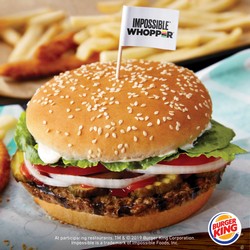The vegan diet has been around for more than a thousand years, and throughout the past decade has become more popular than ever. For many, the thought of ever giving up meat is too much to fathom. For others, a vegan diet and its surplus of benefits offer an appealing lifestyle.
Since 2011, company Impossible Foods has been developing and producing a variety of foods that are commonly meat-based, and altering them into vegan options, through the substitution of meatless ingredients. Some of the products they have crafted range from sausage, tacos, meat pizza, and arguably their most desirable creation, the Impossible Burger.
Although the Impossible Burger was launched in 2016, it has just now recently become trendy in society, with versions of it being refashioned at common food chains across the world, including Burger King, White Castle, Red Robin, and the Cheesecake Factory.
Regarding impossible burger sales, Daniel Hudson, an employee at Burger King in Ocean Township, puts it this way: “They sell like water bottles in the desert.”
The Impossible Burger, standing at an average cost of about $13, is a vegan hamburger that looks and tastes like real beef but is made with a plant-based patty. It was FDA approved in late July this year, and not long after made its debut in food stores by September.
The key ingredient in the Impossible Burger is heme, which is a molecule found in plants. Heme is what allows the patty to taste like actual meat and in combination with fermented yeast, soy plants, starch, sunflower oil, and other natural ingredients, makes for a very meat like, meatless hamburger.
Alexa LaVere, a senior health studies student at Monmouth University, has been vegan for almost two years now. “I am able to vividly recall the taste of meat,” said LaVere. “The Impossible Burger that I tried did an extraordinary job at mimicking the texture, appearance, and taste of an actual hamburger.”
Alongside the general consensus of the Impossible Burger tasting good, there are also a variety of health benefits the burger offers. The most appealing health factor of the Impossible Burger is its high volumes of vital nutrients, such as iron and vitamin B12. Additionally, it is low in sugar and high in fiber, with no more calories than a regular beef burger, making it more than safe to eat.
Jessica Henry, junior public health student at Monmouth University, is the President of the interest group Friends of Animals at Monmouth (FAM). When reflecting upon her diet, Henry says that she has, “found veganism to be incredibly healing and eye-opening.”
Andrea Hope, E.d.D, Associate Professor of Health and Physical Education at Monmouth University, follows a plant-based diet herself, “There is overwhelming evidence that a plant-based diet helps to reduce the risk of many chronic diseases, including heart disease and cancer,” said Hope.
The Impossible Burger also has an assortment of environmental advantages in comparison to a beef patty. The most prominent goal of the makers of the Impossible Burger is to turn the global food system into a fully sustainable and eco-friendly network. The production alone uses 96 percent less land, and 87 percent less water than that of animal meat. Not only that, but almost 90 percent less greenhouse gas emissions are produced in the process. These types of wastes are a result of the production of the world’s animal food products, and Hope says that they “have a detrimental effect on our environment.”
There are various reasons people are often hesitant to switch to a vegan or plant-based diet, most times due to health factors, expenses, or the simple fear of taste dissatisfaction. Out of the billions of people living in the world, only about 75,3000,000 are vegan; that is less than .1 percent of the worldwide population.
However, with the mass production and growing availability of foods like the Impossible Burger, it seems as though the vegan diet is becoming increasingly more achievable for the average food-loving individual.
When asked about her personal plant-based diet, Professor Mary Harris, Director of Plants for Peace at Monmouth University, said, “My health completely transformed, my energy levels increased dramatically, and everything I was able to eat as an omnivore, I was able to find a vegan version I could make that was healthier for me.”
Whether you follow a vegan diet, eat plant-based, or love to indulge in some wings and cheese- steaks on a late Friday night, there is no reason you shouldn’t give the Impossible Burger a try…for all you know, it could take only one bite of this plant-based patty for you to never go back to real beef.
IMAGE TAKEN from [Impossible Foods]




